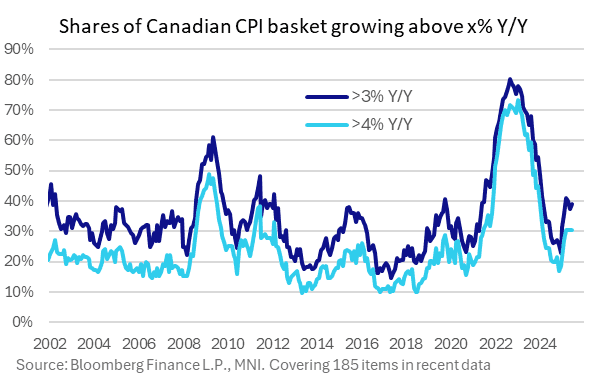MNI INTERVIEW: Surge Pricing Mandate Would Aid BOC- Andolfatto

Adding an emergency surge pricing mechanism that allows for temporary overshooting of the inflation target to next year's Bank of Canada mandate review would improve transparency and public support in case of another stumbling block similar to the pandemic, former BOC adviser and St. Louis Fed economist David Andolfatto told MNI.
Pandemic deficit spending was bound to lift prices and adhering too narrowly to the 2% inflation goal in a future squeeze will make things worse by threatening a painful recession, Andolfatto said. Distrust from pandemic policies could be repaired with mandate language making clear the case for emergency fiscal and monetary coordination and the potential for above-target inflation, he said.
“You could imagine the way taxi cab drivers sometimes raise the fares, there’s suddenly a spike in the price of fuel and for the time being, we're going to elevate the fare to reflect that,” he said in an interview from the University of Miami where the Vancouver native now leads the economics department.
Covid exposed a need for rapid spending even unlike say the Korean War, when governments raised taxes taking pressure off monetary policy, Andolfatto said. Such tradeoffs could return soon, he added, as Canada is set to boost military spending to 5% of GDP to meet a NATO target and Prime Minister Mark Carney is rejecting talk of tax hikes.
Policymakers can choose between higher income or wealth taxes and an "inflation tax" and it's best to clarify that in the Bank's operations, Andolfatto said. “If you agree that the inflation tax is playing a role, then the Bank of Canada clearly cannot be expected to hit its inflation mandate at 2% through this crisis. You have to cut it some slack, and Parliament has to recognize it be built into the legislation.”
FIGHTING THE RIGHT WAR
Fiscal dominance is less of a concern for Andolfatto, who pointed to wartimes in Canada and the United States where that happened but was understood as wider patriotic challenge. “Do you want to create a recession through when you're fighting the Japanese in the Second World War?” he asked.
Bank officials have expressed regret about pain from the inflation jump and Conservative Leader Pierre Poilievre called for Governor Tiff Macklem's firing saying he underwrote inflationary deficits. The Bank didn't start hiking until March 2022, a full year after CPI moved above 3%, though the effects of the pandemic at the time remained unclear. (See: MNI: Trudeau Privy Advisers Studied Sticky CPI, Higher Rates)
The Bank's mandate is keeping inflation in the middle of a 1% to 3% band and CPI reached about 8% as the Covid shutdowns eased. There is also flexibility in not being required to fix past misses. (See: MNI INTERVIEW: Strip Job Language From BOC Mandate- Ex Fellow)
Public dismay is misguided according to a paper he wrote for the CD Howe think-tank, and Andolfatto said Macklem deserves better especially from political critics. “He's a dedicated public servant following the mandates of the Bank of Canada, and he guided the Bank of Canada in the way he and his committee thought were best," said the former classmate of Macklem.
"My recollection is the Conservatives did probably support a lot of the stimulus,” Andolfatto said. “What would he (Poilievre) have done, let interest rates go to 20%?”
